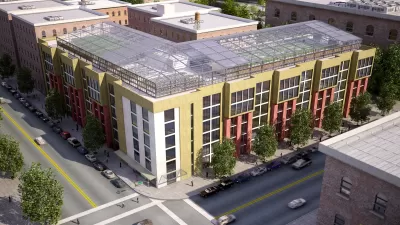Josh Barro examines the possible use of inclusionary zoning to generate affordable housing stock in the city of New York City finding that the only way to build more affordable units is by increasing density.

As part of an ambitious plan to build new housing, New York City Mayor Bill de Blasio is proposing that the city create more affordable housing units by making inclusionary zoning mandatory because the cost of affordable units under the current voluntary system makes them a hard sell, even with density bonuses as incentives. "Mayor Bill de Blasio wants to create more affordable units by making inclusionary zoning mandatory: In areas rezoned to allow more density, developers would have to set aside inclusionary units, whether they used the additional density permitted by the zoning or not. By imposing this mandate, the mayor hopes to get both bigger buildings and more affordable units within those buildings."
Acknowledging that mandatory inclusionary zoning has proven both unpopular and, possibly, less than effective, Barro considers an alternative measure: "Nathan Newman, the housing activist behind the group More NYC, offers another suggestion: straight up cash. In a recent report, he argued that the city should drop inclusionary zoning and instead offer developers additional density in exchange for cash payments that the city could use to finance affordable housing programs."
The problem with that plan is that pesky scarcity of available land, which also makes the cash for affordable housing deal less than ideal: "if new dollars to subsidize affordable housing end up chasing fixed quantities of land and apartments, that could just drive up rents for middle-income New Yorkers."
In summation, "the city should impose this costly mandate only if it also increases possible development and decreases the cost of building."
FULL STORY: Affordable Housing That’s Very Costly

Maui's Vacation Rental Debate Turns Ugly
Verbal attacks, misinformation campaigns and fistfights plague a high-stakes debate to convert thousands of vacation rentals into long-term housing.

Planetizen Federal Action Tracker
A weekly monitor of how Trump’s orders and actions are impacting planners and planning in America.

In Urban Planning, AI Prompting Could be the New Design Thinking
Creativity has long been key to great urban design. What if we see AI as our new creative partner?

Cal Fire Chatbot Fails to Answer Basic Questions
An AI chatbot designed to provide information about wildfires can’t answer questions about evacuation orders, among other problems.

What Happens if Trump Kills Section 8?
The Trump admin aims to slash federal rental aid by nearly half and shift distribution to states. Experts warn this could spike homelessness and destabilize communities nationwide.

Sean Duffy Targets Rainbow Crosswalks in Road Safety Efforts
Despite evidence that colorful crosswalks actually improve intersection safety — and the lack of almost any crosswalks at all on the nation’s most dangerous arterial roads — U.S. Transportation Secretary Duffy is calling on states to remove them.
Urban Design for Planners 1: Software Tools
This six-course series explores essential urban design concepts using open source software and equips planners with the tools they need to participate fully in the urban design process.
Planning for Universal Design
Learn the tools for implementing Universal Design in planning regulations.
Appalachian Highlands Housing Partners
Gallatin County Department of Planning & Community Development
Heyer Gruel & Associates PA
Mpact (founded as Rail~Volution)
City of Camden Redevelopment Agency
City of Astoria
City of Portland
City of Laramie




























